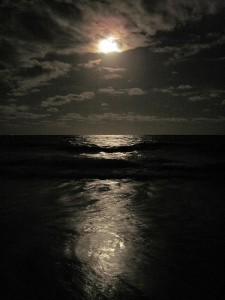Campfires on Shell Key will be prohibited during the May 1 – Sept. 30 Sea Turtle nesting season. This seasonal ban is intended to address the problem caused by light pollution on nesting and hatching sea turtles. It’s no secret that I am a longtime advocate for camping rights on Shell Key. But, I am also a longtime opponent of nighttime light pollution – and a well known turtle fan. If a seasonal campfire ban will help preserve these threatened species, I can live with that. And yet, the prospect of a seasonal ban fills me with a sense of ‘deja vu’ – and a nagging concern that poor communication and lack of public notification might eventually lead to an unnecessary, year-round ban.
 Turtles and light pollution
Turtles and light pollution
Hatchling sea turtles are instinctively drawn toward the reflected moonlight and starlight that glitters on the nighttime ocean. Artificial lights can cause these turtles to become disoriented and crawl toward land instead. Biologists have determined that the largest threat to nesting turtles comes from direct, artificial “daylight” type bulbs. As a result, many coastal communities now require hotels and beach resorts to use “turtle friendly” amber lighting. Some contributors to this blog have pointed out that campfires also give off an amber/red light. Nevertheless, keeping any forms of artificial light to a minimum during nesting season is certainly the right thing to do for our testudinal friends. Friends of Shell Key encourages you to spread the word about the summer ban so that there can be no confusion about the rules …
Beware the slippery slope
Those of us who were present during the early years of the Shell Key management plan know all too well that a seasonal ban can, for no good reason, turn in to a year-round ban. Once upon a time, you could include your family dog in your camping and recreational activities in the public use areas of the island. In 2000, a summertime ban was enacted to protect nesting seabirds from dogs. The seasonal ban was painful to dog owners and their pets – but it made sense – and it was an acceptable compromise that allowed our canine companions to enjoy the island during other times of year. Before long, however, the county decided that the poorly enforced, seasonal ban was too “confusing” and determined that a more draconian year-round ban was necessary. Why did this happen? 2 words:
1) Start with reasonable, targeted restrictions to protect natural resources
2) Communicate poorly and fail to enforce the laws
3) Declare targeted restrictions a failure and enact more draconian measures
4) Alienate the public through further exclusion from resources creating resentment & disdain for preservation.
Poor Communication …
At the time of the proposed year-round ban, we made the argument that the public was not being well informed about the seasonal pet ban. The “rules” signs on the island were, quite frankly, abominable. They violated every tenet of good advertising and clear communication. These signs were designed to repel – not attract – attention. Rather than take action to improve communication with island visitors, officials took an easy way out and simply banned pets all year round. This cynical action neither educated the public nor reduced the number of dogs on the island during nesting season. It merely created an occasional source of revenue for the county from the citations randomly issued to pet owners. Enforcement of the rules on Shell Key is expensive – and is limited to the occasional marine law enforcement presence – usually on the busiest holidays of the year. And this really gets to the core of my concern…
Education works better than the threat of punishment
Let there be no ambiguity: We support sensible efforts to protect nesting turtles and shorebirds. And we believe that public outreach is the best tool at our disposal to protect these resources. Good communication, public awareness and volunteer efforts will do FAR more for the cause of preservation than will excessive and draconian rules with sporadic enforcement. Lets implore our county officials to think of creative ways to communicate the plight of nesting sea turtles and to help give visitors to Shell Key a sense of inclusion in the preservation of this resource. This is our mission at shellkey.org and we are here to help. If you have any comments about the seasonal campfire ban, please feel free to join the discussion below …


Very considerate oversight measure to health and safety by the FWC! There should always be a 700 ft. buffer zone between carcinogenics from wood smoke and sea turtles or humans for that matter.
Actually, this is not a new regulation. FWC has always banned fires on all beaches during sea turtle nesting season (May 1 through October 31 on west coast beaches). The state only became aware last season that the regulation was not being enforced on Shell Key. Even the sea turtle nesting surveyors did not think twice about it (because campfires were the norm on Shell Key) until the issue came up, and then everyone said, “OH, that’s right…no fires…..”
Was there any opportunity for public input/comment before passing this new ban on fires? If so was it advertised/notice given to public? Was it a Pinellas Co. Parks & Conservation call or is another department responsible?
Ashley, We did not receive any notice at all from the county. I first heard about the ban from a newspaper reporter – who read it on a county press release issued after the new rule went into effect. The contact at the Pinellas County “Parks and Preserves” department is Pam Leisure.